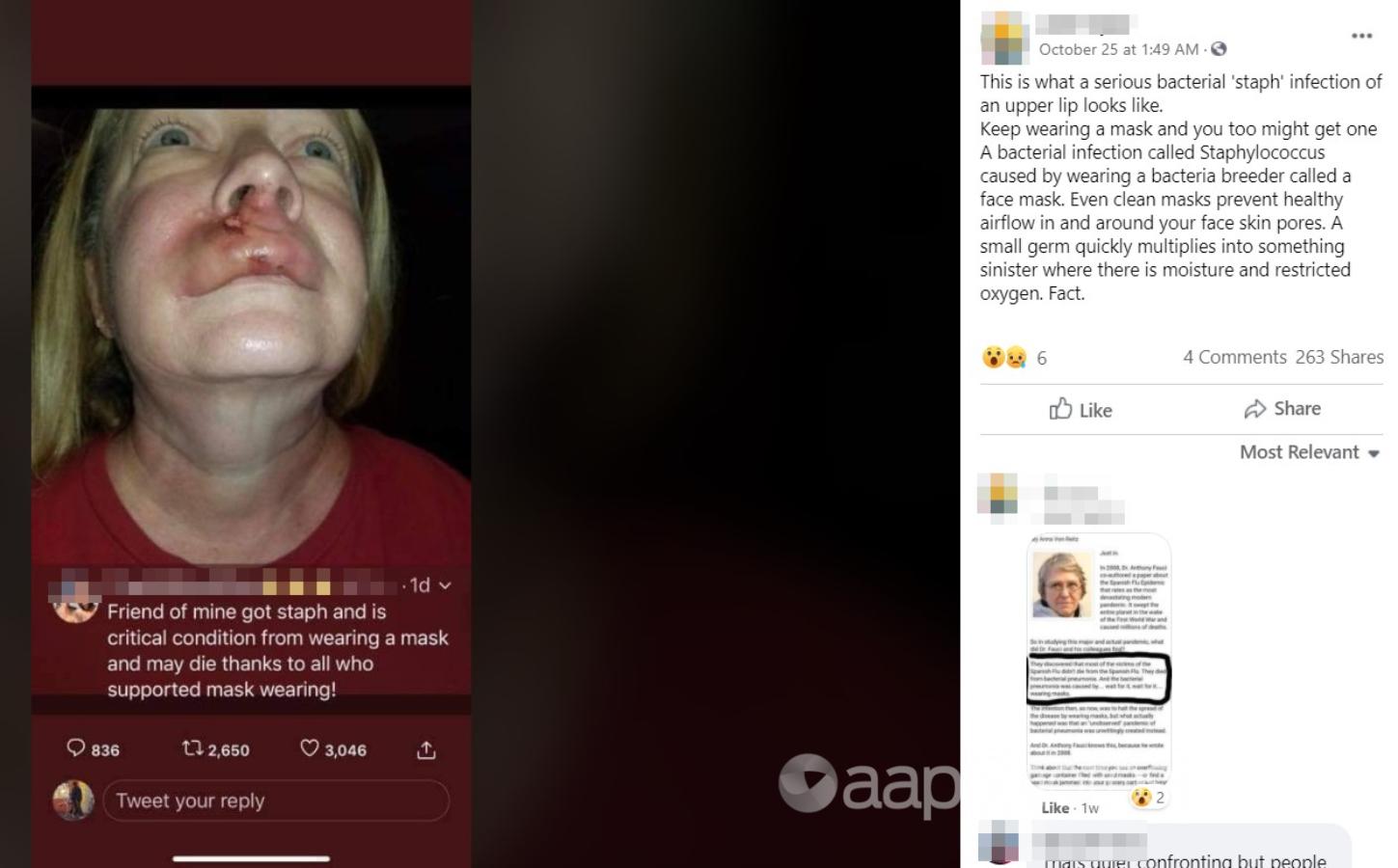The Statement
Widely shared social media posts say wearing face masks can cause infections from bacteria such as staphylococcus.
One Facebook post bearing the claim features a screenshot of a tweet that includes an image of a woman with a severely swollen lip. The caption accompanying the image reads: “This is what a serious bacterial ‘staph’ infection of an upper lip looks like.”
“Keep wearing a mask and you too might get one. A bacterial infection called Staphylococcus caused by wearing a bacteria breeder called a face mask,” the post continues.
“Even clean masks prevent healthy airflow in and around your face skin pores. A small germ quickly multiplies into something sinister where there is moisture and restricted oxygen. Fact.”
At the time of publication, the October 25 post had been shared more than 260 times by users in Australia, the UK and Canada and attracted more than 15,000 views.

The Analysis
Despite the wearing of face masks being identified as an important measure in preventing the spread of COVID-19 by the likes of the World Health Organization, the protective coverings have been the subject of numerous false claims (see examples here and here).
However, experts told AAP FactCheck there was no evidence that mask-wearing was linked to increased risk of staphylococcus (staph) infections, which could occur anywhere that broken skin became infected.
The Facebook post includes a screenshot of an October 23 tweet in which a user claims: “Friend of mine got staph and is critical condition from wearing a mask and may die thanks to all who supported mask wearing!”
At the time of publication, the tweet had been retweeted more than 3700 times and attracted 3200 likes.
Staphylococcus aureus bacteria can cause serious infections, which usually occur when there is a cut or other open wound in the skin, according to the University of Michigan.
In some cases, these infections can spread to other parts of the body, it says. Staph infections can be treated with antibiotics.
But Dr Louise Reiche, president of the NZ Dermatological Society, said face masks do not cause staph infections, which were generally a result of damaged skin.
“If you’ve got damaged skin then damaged skin is more susceptible to secondarily picking up an infection, whether it be staph or another infection,” she told AAP FactCheck in a phone interview.
“That’s because the skin surface, when the skin is intact, is a good barrier against the outside world. But if the barrier is disrupted, then it’s easier for infections, allergies and other matters to get in.”
UNSW Sydney epidemiologist Dr Abrar Ahmad Chughtai told AAP FactCheck in a phone interview that there was no scientific basis to the claims of the post.
“We’ve never seen this. Many healthcare workers have been using face masks for many years. I also have been using masks and I have never faced this problem,” he said.
A 2001 study, published in the Journal of Hospital Infection, found that wearing masks significantly reduced the chances that chances of staff becoming carriers of methicillin-resistant staph, an antibiotic-resistant strain of the bacteria, when they were exposed to the pathogen in a dedicated treatment ward.
“Staph bacteria is present on our nose, on our mouth, it’s very common. If there is a breach in the skin, for example, if there is already a cut on the face or acne, this is the only possible way an infection could happen,” Dr Chugtai said.
Nevertheless, he advised those with skin conditions or related problems against wearing masks.
The Learn About Covid19 blog, run by a group of public health experts and journalists, offers similar advice: “In order to develop a staph infection, the person wearing the mask would have to have an open lesion or untreated wound on their face, but even then, it very rarely happens.”
It recommends people use moisturiser to protect their skin from any irritation that could develop into an open wound.
According to UC Health, a not-for-profit health care system in Colorado, there are several ways people can prevent staph infections. These include keeping cuts and scrapes clean until they heal, avoiding contact with others’ wounds and not sharing personal items such as towels and razors.
Similar claims about masks causing staph infections have been debunked here, here and here.

The Verdict
Mask-wearing does not lead to staph infections, experts say, which can occur where there is broken or irritated skin irrespective of face-coverings. Healthcare workers, for example, routinely wear masks for extended periods and there is no evidence of increased risks of facial infections among this cohort.
False – Content that has no basis in fact.
AAP FactCheck is an accredited member of the International Fact-Checking Network. If you would like to support our independent, fact-based journalism, you can make a contribution to AAP here.
All information, text and images included on the AAP Websites is for personal use only and may not be re-written, copied, re-sold or re-distributed, framed, linked, shared onto social media or otherwise used whether for compensation of any kind or not, unless you have the prior written permission of AAP. For more information, please refer to our standard terms and conditions.

















